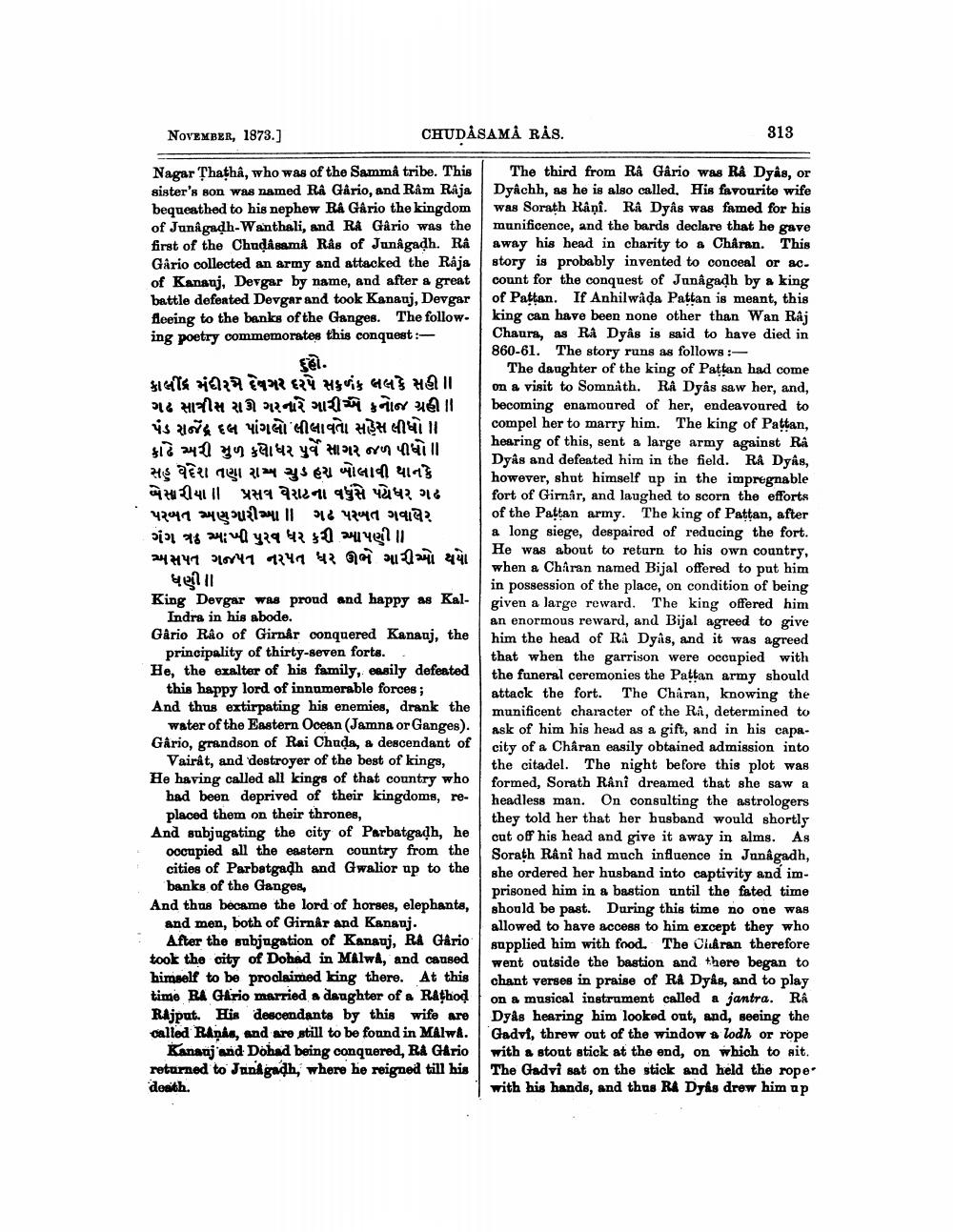________________
NOVEMBER, 1873.]
CHUDÅSAMÅ RÅS.
313
Nagar Thatha, who was of the Sammâ tribe. This sister's son was named Ra Gario, and Ram Raja bequeathed to his nephew Ra Gârio the kingdom of Junagadh-Wanthali, and RA Gârio was the first of the Chudasama Râs of Junagadh. Rå Gårio collected an army and attacked the Raja of Kananj, Devgar by name, and after a great battle defented Devgar and took Kanauj, Devgar fleeing to the banks of the Ganges. The follow. ing poetry commemorates this conquest :
sel. કાલીક મંદીર દેવગર દર સકલંક લલકે સહી II ગઢ સાત્રિીસ રાશ ગરનારે ગારીએ કનેજ ગ્રહી . પંડ જે દલ પગલે લીલાવતા સાહેસ લીધો છે કાઢે અરી મુળ કલાધર પુર્વે સાગર જળ પીધો સહુ દેશ તણું રાખ ચુડ હિરા બોલાવી થાનકે બેસરીયા | પ્રસવ વેરાટના વસે પધર ગઢ પરબત બણગારીઆ || ગઢ પરબત ગવાર ગંગ ત્રઠ આખી પુરવ ધર કરી આપણી || અસપત ગજપત નરપત ધર ઊભે ગારીઓ થો
weil il King Devgar was proud and happy as Kal
Indra in his abode. Gario Rão of Girnår conquered Kanaaj, the
principality of thirty-seven forts.. He, the exalter of his family, easily defeated
this happy lord of innumerable forces; And thus extirpating his enemies, drank the
water of the Eastern Ocean (Jamna or Ganges). Gârio, grandson of Rai Chuda, a descendant of
Vairât, and destroyer of the best of kings, He having called all kings of that country who
had been deprived of their kingdoms, re
placed them on their thrones, And subjugating the city of Parbatgadh, he
occupied all the eastern country from the cities of Parbatgadh and Gwalior up to the
banks of the Ganges, And thus became the lord of horses, elephants,
and men, both of Girnår and Kananj.
After the subjugation of Kananj, RÅ Gario took the city of Dohad in Malwa, and caused himself to be proclaimed king there. At this time RA Gario married a daughter of a Rathod Rajput. His descendants by this wife are called Ranks, and are still to be found in MAlwA.
Kanaaj and Dohad being conquered, Ra Gario returned to Junagadh, where he reigned till his death.
The third from Rå Gârio was Rå Dyás, or Dyachh, as he is also called, His favourite wife was Sorath Râņi. Rå Dyâs was famed for his munificence, and the bards declare that he gave away his head in charity to a Charan. This story is probably invented to conceal or ac. count for the conquest of Junagadh by a king of Pattan. If Anhilwada Pattan is meant, this king can have been none other than Wan Raj Chaura, as RÅ Dyâs is said to have died in 860-61. The story runs as follows:
The daughter of the king of Pattan had come on a visit to Somnath. Rå Dyâs saw her, and, becoming enamoured of her, endeavoured to compel her to marry him. The king of Pattan, hearing of this, sent a large army against Ra Dyås and defeated him in the field. RA Dyâs, however, shut himself up in the impregnable fort of Girnar, and laughed to scorn the efforts of the Pattan army. The king of Pattan, after a long siege, despaired of reducing the fort. He was about to return to his own country, when a Charan named Bijal offered to put him in possession of the place, on condition of being given a large reward. The king offered him an enormous reward, and Bijal agreed to give him the head of Ra Dyas, and it was agreed that when the garrison were occupied with the funeral ceremonies the Pattan army should attack the fort. The Charan, knowing the munificent character of the Ra, determined to ask of him his head as a gift, and in his capacity of a Chåran easily obtained admission into the citadel. The night before this plot was formed, Sorath RÂni dreamed that she saw a headless man. On consulting the astrologers they told her that her husband would shortly cut off his head and give it away in alms. As Sorath Rânî had much influence in Junagadh, she ordered her husband into captivity and imprisoned him in a bastion until the fated time should be past. During this time no one was allowed to have access to him except they who supplied him with food. The Cläran therefore went outside the bastion and there began to chant verses in praise of Ra Dyås, and to play on a musical instrument called a jantra. RA Dyds hearing him looked out, and, seeing the Gadvf, threw out of the window a lodh or rope with a stoat stick at the end, on which to ait. The Gadvi sat on the stick and held the rope with his hands, and thus RA Dyls drew him ap




